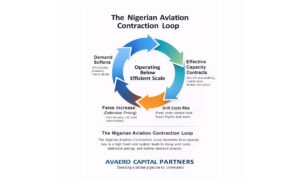Nigeria stands at a crossroads. With fresh bilateral air agreements inked with Barbados and Trinidad & Tobago, and Jamaica in the crosshairs, Nigerian carriers face both unprecedented opportunity and substantial risk. The recent withdrawal of aviation giants TUI and Virgin Atlantic from Saint Lucia routes offers a masterclass in what not to do when launching ambitious transatlantic services.
These Caribbean agreements represent more than mere paperwork. They signal Nigeria’s strategic pivot toward establishing itself as an aviation bridge between Africa and the Caribbean, reconnecting historical diaspora links while opening new commercial corridors. But good intentions and signed agreements don’t guarantee profitable routes.
The question isn’t whether Nigerian airlines can fly to the Caribbean. The question is whether they can sustain these routes where others have failed. The answers lie in understanding five critical lessons from the TUI and Virgin Atlantic experience.
Beyond Point-to-Point Thinking
TUI and Virgin Atlantic both operated direct UK-Saint Lucia services, relying primarily on leisure travelers heading in one direction. When demand softened, the economics crumbled. This single-stream dependency proved fatal.
Nigerian carriers must recognize that passenger volume alone won’t sustain these routes. The Nigeria-Caribbean corridor requires multiple traffic streams, including business travelers, diaspora visits, tourism in both directions, and cargo opportunities. Any business case built on a single passenger segment will likely fail.
Consider a Nigerian airline launching Lagos-Barbados service. Would Nigerian tourists alone fill those planes? Would Caribbean business travelers? Neither stream alone provides sufficient density. The math simply doesn’t work without multiple, complementary traffic flows.
Network Design Trumps Isolated Routes
British Airways continues to serve Saint Lucia successfully through multi-stop operations. Their London Gatwick-Saint Lucia-Grenada routing allows them to tap into multiple markets with a single aircraft rotation, improving load factors and spreading fixed costs across more revenue opportunities.
Nigerian airlines should study this model carefully. A Lagos-Barbados-Trinidad routing could combine multiple markets, capturing different passenger segments while maximizing aircraft utilization. This approach transforms three potentially unsustainable point-to-point routes into one viable network operation.
Even more promising might be triangular operations, such as Lagos-Kingston-Port of Spain-Lagos. This design allows Nigerian carriers to serve multiple destinations while ensuring the aircraft returns to base efficiently, avoiding costly positioning flights.
The network approach also creates resilience. When demand to one destination softens, strength in other markets can compensate. This flexibility proved absent in the rigid point-to-point models that failed in Saint Lucia.
Partnership Ecosystems Drive Success
TUI, despite being a package holiday specialist with built-in distribution advantages, still couldn’t make Saint Lucia work when market conditions shifted. This reveals a critical truth: even integrated operators struggle without comprehensive partnership ecosystems.
Nigerian airlines face an even steeper challenge. Without established tour operations or holiday packaging capabilities, they must build demand-generation partnerships from scratch. This means:
- Deep collaboration with Caribbean tourism boards
- Joint marketing agreements with hotel chains
- Commission structures with tour operators in both regions
- Corporate travel agreements with businesses operating across both markets
- Diaspora community engagement programs
Success requires Nigerian carriers to think beyond the aircraft. They must become architects of travel demand, not just providers of seats. This means investing in sales and marketing infrastructure in Caribbean markets where Nigerian brands currently have limited recognition.
The Caribbean side of the equation presents unique challenges. Student travel, medical tourism, and trade delegations from Trinidad or Barbados to Nigeria represent untapped segments requiring specialized sales approaches and targeted campaigns.
Seasonal Strategies for Year-Round Viability
The Saint Lucia experience demonstrates that winter tourism peaks alone cannot sustain year-round service. Nigerian-Caribbean routes will face similar seasonal fluctuations, particularly if heavily weighted toward leisure or visiting friends and relatives (VFR) traffic.
Smart seasonal management requires flexibility. Nigerian carriers should consider:
- Seasonal scheduling with reduced frequencies during shoulder periods
- Aircraft redeployment strategies during low seasons
- Targeted promotions to stimulate counter-seasonal travel
- Cargo focus during passenger low seasons
- Potential ACMI (Aircraft, Crew, Maintenance, Insurance) leasing during peak periods rather than year-round fleet commitments
Air Peace’s approach to international expansion provides a template. Their gradual build-up of frequencies to Dubai, for instance, shows how Nigerian carriers can test markets before committing full capacity, allowing demand patterns to reveal themselves before making irreversible fleet decisions.
Government Alignment Creates Foundations
Saint Lucia’s vulnerability following airline withdrawals highlights the danger of relying solely on external carriers. The lesson for Nigeria and its Caribbean partners is clear: air connectivity requires coordinated government action across multiple domains.
Success demands alignment between:
- Nigeria’s Aviation Ministry and Caribbean counterparts on route rights and frequencies
- Nigeria Tourism Development Corporation (NTDC) and Caribbean tourism authorities on joint promotion
- Foreign affairs ministries on visa facilitation and diplomatic support
- Trade ministries on cargo opportunities and commercial exchanges
- Customs and immigration authorities on streamlined entry procedures
Without this whole-of-government approach, Nigerian carriers will face unnecessary headwinds. High airport charges, complex visa processes, or excessive taxation can undermine even the best-designed routes.
The recent Nigeria-Barbados air services agreement represents a promising start, but implementation requires sustained focus from both governments to translate paperwork into passenger flows.
Building the Nigeria-Caribbean Bridge
The withdrawal of Virgin Atlantic and TUI from Saint Lucia offers Nigerian carriers a valuable case study in route development strategy. Their experience reveals that even world-class airlines with strong brands can fail without comprehensive ecosystem approaches.
For Nigerian airlines eyeing Caribbean opportunities, success requires moving beyond simplistic point-to-point thinking. The sustainable model combines multiple destinations, secures comprehensive marketing support, coordinates with regional events and peak travel periods, and ensures aircraft are appropriately sized with realistic utilization targets.
Most promising appears to be a hub-and-spoke or triangular model connecting diaspora-rich cities with high cargo potential. Routes like Nigeria-Jamaica-Miami, Nigeria-Trinidad-Barbados, or Nigeria-Barbados-Brazil offer more sustainable economics than direct point-to-point services.
The Nigeria-Caribbean corridor represents more than just a commercial opportunity. It offers a chance to reconnect communities separated by centuries, rebuild cultural bridges, and create new economic partnerships across the Atlantic. But realizing this vision requires Nigerian carriers to learn from those who tried and failed before them.
The lessons from Saint Lucia are clear. Nigerian airlines that heed them will find themselves not just flying aircraft between continents, but building sustainable bridges between worlds.
Disclaimer: The insights shared in this article are for information purposes only and do not constitute strategic advice. Aviation markets and circumstances vary, and decisions should be based on your organisation’s specific context. For tailored consultancy and guidance, please contact info@avaerocapital.com.




